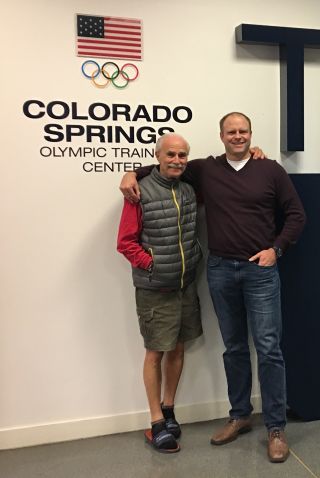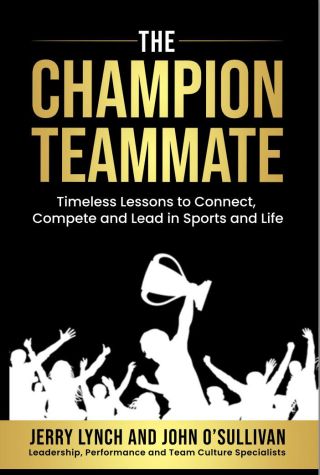LONELINESS- How to Overcome Feeling Lonely and Powerless. Here are empowering strategies from championship teams. Reviewed by Davia Sills

KEY POINTS-
- Everyone needs to feel a sense of belonging.
- By focusing on being rather than doing, people can connect with their feelings and reach out to others.
- Taking care of the little things one can control builds one's sense of agency.
- Cultivating joy and gratitude can energize people and restore their sense of connection.
Have you been feeling lonely and isolated lately? If so, you’re not the only one. We’re experiencing an epidemic of loneliness and isolation, according to U.S. Surgeon General Vivek Murthy (Murthy, 2023).

But now award-winning coaches and consultants Jerry Lynch and John O’Sullivan offer powerful strategies for renewing our sense of connection to flourish not only in sports but also in the larger arena of life.
To flourish, we all need to feel a sense of belonging (Allen, Kern, Rozek, McInereney, & Slavich, 2021; Pope & Miles, 2022). Yet popular culture reinforces us to feel separate and isolated. “Social media, which was invented to pull us together, is actually what’s pushing us apart,” says John O’Sullivan, who has coached for over 30 years on the youth, high school, and collegiate levels. “And apps like Snapchat are adding AI chatbots to their platforms.” In fact, he says, “Now someone doesn’t even have to connect with another human being—they can just talk to their artificial intelligence robot. It’s scary, and it’s sad” (O’Sullivan, 2023).
Being Rather Than Doing.
Psychologist Jerry Lynch, Ph.D., helps build a sense of belonging within intercollegiate and professional teams by focusing on “being rather than doing.” This is the opposite of what our busy doing culture practices. When people meet him, the first thing they ask is, “What do you do?” He says, “What they’re asking is, what’s keeping me busy?” But as he explains, “We can’t really connect on that level.” What we do is not what we feel and who we are.
Focusing on being rather than doing means being authentic, connecting with our feelings, and even connecting with our fears. John O’Sullivan says that when he sees his players “feeling fear or stress or anxiety about a big game coming up, they feel like there’s something wrong with them.” In reality, he tells them, “All that means is that your body’s telling you that this is important to you, that you care about this because if you didn’t care, you wouldn’t even be nervous.”
When his players see Golden State Warriors star Steph Curry sink a winning free throw in the last few seconds of the game, he says, “They think he’s not nervous.” But professionals like Curry have trained, practiced, and “built the capacity to accept what they’re feeling and perform through it.” And training ourselves to face our challenges is a winning strategy O’Sullivan and Jerry Lynch share in their new book, The Champion Teammate (Lynch & O’Sullivan, 2023).

Win the Day.
We can train ourselves to perform through anxiety by changing our focus. As Jerry Lynch points out, “If your focus is on the outcome and results, which you cannot control, you’re going to feel what we call anxiety. But if you turn that around, you can start thinking to yourself, ‘I’m pretty excited; I get the opportunity to do this.’” He explains that when you focus on the process, not the outcome, then you can use that energy to prevail.
Their book has a powerful example of process over outcome with the Middlebury College men’s tennis team. The team was anxious about heading to the national championship after losing in the finals the year before. Jerry coached them to focus not on the outcome, which they could not control, but on the little things they could do each day in practice to build their skills and “win the day.” This reframe changed their focus. On the day of the finals, they walked onto the court wearing t-shirts with “win the day” on the back. Focused on the process, not the outcome, they did win the day—and the championship (Lynch & O’Sullivan, 2023, p.83).
Jerry says we can all “win the day” by focusing on the little things we can do each day to build our resilience. This can include getting enough sleep, exercise, nutritious food, time in nature, reading, meditating, reaching out to friends, and doing something we love—whatever helps us flourish. He keeps a list of 10 things by his desk that help him live his best life and says, “If I do seven out of those ten, I win the day.” We can’t control the outcome, but we can control our daily choices to live our best life.
Cultivate Joy.
Another empowering strategy is to cultivate joy. Living a joyous life doesn’t just happen. “Joy is a habit,” Jerry says, explaining that joy is one of their top four team values for Steve Kerr, head coach of the Golden State Warriors. “The Warriors’ approach is to say ‘yes’ to life,” he says. “We cannot cure the world of sorrows. But we can choose to live in joy.” Like many of us, Jerry has had many challenges and losses during the COVID pandemic but says we can still choose joy. And as psychologist Barbara Fredrickson’s research has shown, choosing joy creates an upward spiral of positivity and can bring greater positive connections and possibilities into our lives (Fredrickson, 2009).
Practice Gratitude.
One way to cultivate joy in our lives and feel more connected is to express gratitude, one of the most powerful positive psychology interventions. Gratitude, Jerry says, can take us from being “grateful to great.” Our thoughts affect our feelings, he explains, and when our feelings change, our bodies respond. So he recommends that we “focus on all the good things we’ve been given rather than sit there in depression wondering why we don’t have everything we want.”
We can begin a regular gratitude practice by keeping a gratitude journal, writing down three things we’re grateful for each day. Psychologist Robert Emmons has found that practicing gratitude can make a positive difference in our lives on many levels (Emmons, 2007). By focusing on gratitude, we can become happier, healthier, and more successful. We can also overcome loneliness and isolation, feeling more connected to our families, our friends, our community, and our world.
- Questions and Answers
- Opinion
- Motivational and Inspiring Story
- Technology
- Live and Let live
- Focus
- Geopolitics
- Military-Arms/Equipment
- Security
- Economy
- Beasts of Nations
- Machine Tools-The “Mother Industry”
- Art
- Causes
- Crafts
- Dance
- Drinks
- Film/Movie
- Fitness
- Food
- Games
- Gardening
- Health
- Home
- Literature
- Music
- Networking
- Other
- Party
- Religion
- Shopping
- Sports
- Theater
- Health and Wellness
- News
- Culture

